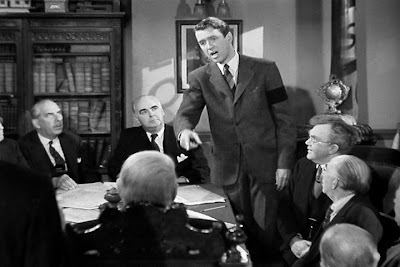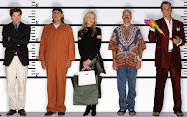_01.jpg)
People sometimes dismiss It's a Wonderful Life as only a Christmas classic, merely an NBC Christmas Eve staple, without really reflecting upon it's message. And if one hasn't grown up watching the film every Christmas Eve like I have, then one might not even be able to recognize why this gem has a place in everyone's heart. For instance, one IMDB poster called it "sentimental hogwash," and someone I know once called it "trite conservative propaganda." But these people are clearly caught up in the spectacle and popularity of the film, and they're not really paying attention to the brilliant script (it's funnier than most people remember) and the fantastic performances by James Stewart (in arguably his greatest role), Lionel Barrymore, and Henry Travers. Does the film have its flaws? Of course -- Mary would have married Sam Wainwright before becoming an old maid, and if Harry hadn't saved the lives of everyone on that transport, someone else would have. But the flaws in the "what ifs" are so minor when compared to the overall message that they can (and should) be overlooked.
It's no secret that this movie is my favorite film of all time. I grew up watching this film, and I identified and related to George Bailey, a young subscriber of National Geographic who wanted to travel and see the world. And the underlying reminder of my mortality resonated with me even as a child to the point that, as rash or abrupt as they may be, I determine most of my choices based on the idea that I could be gone tomorrow. Is the movie conservative? Of course, it emphasizes family values and the need to preserve small business (as to escape the inevitable globalized Pottersville metaphor). Is the movie sappy? Of course, but being sentimental doesn't have to be a bad thing. So here, below, I've listed just some of the reasons why It's a Wonderful Life is more than just a Christmas movie and why it should be everyone's favorite film.
10. Look, Daddy. Teacher says, every time a bell rings an angel gets his wings.

Okay, this line is kind of corny, and director Frank Capra certainly made sure to get the most adorable little girl to play Zuzu. But the reason why this line is so effective is not because of Zuzu but because of George's response. He says softly, "That's right, that's right. Attaboy, Clarence," and he winks to the heavens. One of the smartest things this film did was portray God and the other angels as stars (as opposed to men in white robes hanging out on fluffy white clouds) because it allows the viewer to feel like someone is always watching over them, that stars can hear their prayers. Stars represent a physical means for believing in angels, and I think, as sappy as it is, that's such a wonderful representation. So when George winks to the ceiling (remember, it's nighttime outside), we know that he's really winking to the stars, and to one star in particular who now has his wings. And the above line is quoted so often not because people believe every time a bell rings, an angel gets his wings, but because we're grown accustomed to the angel Clarence, and, like George, we are proud that he was recognized for the world he showed us.
9. I know what I'm gonna do tomorrow, and the next day, and the next year, and the year after that. I'm shakin' the dust of this crummy little town off my feet and I'm gonna see the world. Italy, Greece, the Parthenon, the Colosseum. Then, I'm comin' back here to go to college and see what they know. And then I'm gonna build things. I'm gonna build airfields, I'm gonna build skyscrapers a hundred stories high, I'm gonna build bridges a mile long.
George gives this wonderful speech to Mary after his throws a rock at the old Granville house. And this speech is a lot more meaningful than people realize. George is talking about seeing the world, and it's not just that he wants to leave Bedford Falls, it's that he knows there's an entire world out there that he wants to see. This becomes relevant at the end of the movie when -- as hokey as it sounds -- Bedford Falls, his family, and his friends become his world. No, George doesn't get to build airfields and skyscrapers, but he does get to build Bailey Park, a residential area for families (such as the Gowers) to rest. And the brilliant part about this speech is that it's right outside of the Granville house, which they later move into, and while George is building scale models of buildings and bridges, Mary is the one who is refurbishing that building into a home. George's mind is constantly outside of Bedford Falls, and all he can think about is what he didn't do rather than all that he's accomplished. This speech is so uplifting in the moment that you almost forget how trapped he will feel later, but this speech is a reminder that sometimes your reality is just as good as your dreams.
8. Just remember this, Mr. Potter, that this rabble you're talking about... they do most of the working and paying and living and dying in this community. Well, is it too much to have them work and pay and live and die in a couple of decent rooms and a bath? Anyway, my father didn't think so. People were human beings to him. But to you, a warped, frustrated old man, they're cattle. Well, in my book he died a much richer man than you'll ever be.

Here's another one of Jimmy Stewart's fantastic speeches (see also: Mr. Smith Goes to Washington and Harvey). I can honestly say there will never be another Jimmy Stewart, though Hollywood likes to cast Tom Hanks in that role. There will be other Clark Gables and Cary Grants, but there won't be another actor like Jimmy Stewart with his aw-shucks charm and boy-next-door demeanor. Stewart doesn't play this speech with anger but with honesty. Potter is a crooked old man, and with repeat viewings, you will find yourself cheering during this speech. (I'm not going to lie; I sometimes clap when watching this scene.) And, of course, the final line ties back into the larger motif of the film; like his father, George will grow to be "the richest man in town."
7. Why don't you kiss her instead of talking her to death? Ah, youth is wasted on the wrong people.
_NRFPT_01%5B1%5D.jpg)
This entire scene (see previous post for the video) makes you believe in love again. At 38, I don't know if Stewart quite passes off realistically as college-aged, but that's no matter. Donna Reed is absolutely glowing in this scene (thanks to a soft focus), but why wouldn't she be when opposite the most charming man in the world? There are plenty of fantastic lines in this scene, the least of which is "This is a very interesting situation!" There's just something about the way Stewart delivers that line that makes me crack up, and the following dialogue is quite hilarious. After Mary drops her robe and hides behind the hydrangea bushes, George considers selling tickets to the spectacle. "George Bailey, I'm ashamed of you! I'm going to tell your mother." "Oh, she's way down the street." But the line that everyone remembers is the cranky old neighbor who scoffs at their flirtation. He doesn't seem like the romantic type himself, which is what makes his delivery of "youth is wasted on the wrong people" so funny, but it's George's defensive response that really sells the scene: "You want me to kiss her? Hey, come back here. I'll show you some kissing that'll make your head spin!"
6. The kiss.
Watch the scene above. Then remind yourself to breathe. Then repeat. Famously, this scene actually had a lot left out. As the story goes, Stewart and Reed were so caught up in the scene that they skipped over eight pages of dialogue, and to the screenwriter's dismay, Capra accepted this scene in only one take, and it's the final version you see in the film. This kiss is intense -- for 1946 and 2008 -- because it's impassioned and frightening and romantic all at the same time. It's hot and cold, dangerous and safe, scary but rewarding. Mary's been waiting for this moment, and it comes just after George declares he never wants to get married. Most people list this as one of the most romantic kisses in cinema, and I certainly wouldn't argue against that, but there's also a darkness to this scene that I think indicates the troubles ahead for George. He's not settling for Mary and I don't believe he's giving up on himself, but I do think George is well-aware of the conflicts inherent in his decision to be with her.
5. Is this the ear you can't hear in? George Bailey, I'll love you 'til the day I die.
Okay, this scene just makes me happy. Young Mary is adorable. This scene also brings us the oft-quoted (as least for me) line, "You don't like coconut? Say brainless, don't you know where coconuts come from?" You'd be surprised how applicable that line is to many situations.
4. My mouth's bleeding, Bert! My mouth's bleeding! Zuzu's petals... Zuzu...

This scene is really fantastic because George isn't just happy to be alive, and it's not until he's running through Bedford Falls that he's thankful that Pottersville is no more. This scene is actually about the family, and like so much of this film, there are layers that allude and reference other parts of the film. George is happy because Bert recognizes him, that his old and dear friend remembers him. He's happy because he still has Zuzu's petals, even though those petals represent Zuzu's sickness and the earlier altercation between George and Zuzu's teacher's husband. Those petals symbolize George's life -- decaying and with a hint of sadness and bitterness, and yet they're so beautiful. And Zuzu loves those petals. And thus George loves those petals because he loves Zuzu. And again, this is a really strong performance from Stewart. He is genuinely ecstatic to come home to his family, even if it means going to jail, because they are the bridges and skyscrapers that make up his life's greatest work.
3. Every man on that transport died! Harry wasn't there to save them, because you weren't there to save Harry.
Now, as I mentioned earlier, there are some flaws in the "what if" scenarios that Clarence constructs. If Harry hadn't lived, someone else probably would have been the hero and saved the people on the transport. But still, this scene has the greatest lesson from the entire movie. It's not necessarily about family or having friends (although that's certainly part of it), but that on a much smaller, almost always overlooked note, it's the little things that we do that make up the narrative of humanity. George saved Harry from the broken ice because Harry was his brother. He didn't even think twice about it. And this is an idea that escapes me much too often, that people think of me when I'm not around, that I somehow make a dent in someone else's life. It may be small, and it may be minor, but my very existence -- just walking around, just having conversations -- makes a difference. I think people generally like to see change instantly, rewarded instantly for their efforts. But sometimes our biggest moments are actually small ones, and we might never know how we changed the world just by being in it.
2. Clarence Oddbody, AS2.

Clarence Oddbody, Angel Second Class, doesn't appear until almost thirty minutes are left in the film, and yet Henry Travers's presence is so memorable that you'd think he was in the entire film. Not only is Travers hysterically simple-minded (thank God Capra didn't make Clarence an omnipotent or arrogant goody-goody), but some of the film's best lines involve him. I, for one, love sarcastic George Bailey. "Well, you look about the kind of angel I'd get. Sort of a fallen angel, aren't you," he asks when he first meets Clarence. And then when they're walking back to his car, he tells Clarence, "We'll stroll up to my car and get... Oh, I'm sorry. I'll stroll. You fly." And of course, the funniest Clarence gag is when George calls him Gabriel. There's such an honesty in their relationship that when Clarence does weird things (like order an old-time drink), George still defends him despite his peculiarity. And by the end of the movie, I think everyone wants a Clarence of their own.
1. A toast to my big brother George: The richest man in town.

There are just some scenes from movies that make me cry without even needing to have seen the rest of the film, and this is at the top of that list. I can't even hear this line without misting up. And what makes this scene so magical and truly wonderful is that when Harry says this line, everyone in the room roars in a communal love. They know, just as well as we know, that Harry's not talking about money, and George's reaction is one of heartfelt sincerity. Scenes like this just aren't made anymore. Now, if a movie is trying to be profound or thought-provoking, it tells you. But this scene just unfolds so naturally, and it truly becomes a celebration for life. This scene -- and this movie -- reminds us that, even with all of its hardships and struggles and compromises, it really is a wonderful life.









.jpg)


2 comments:
After reading this, I feel like I missed a big part of Christmas by not watching this movie in 2008. If I watch it twice in 2009 will it make up for it? -G.
I love this post.. Its my favorite too! :)
Im always telling folks not to dismiss it. And you're right, its not jst a Xmas movie.. I watch it year round, cheers me up whenever Im feeling blue. (Shoot, w/o risking being melodramatic, I can say.. Once, it even saved my life.)
Good right up.. I really appreciated it.
Post a Comment